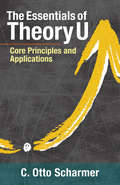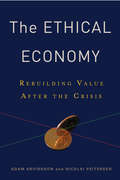- Table View
- List View
The Essential Fromm: Life Between Having and Being
by Erich FrommEssays on human alienation, mode of existence, consumerism, narcissism, and more from &“both a psychologist of penetration and a writer of ability&” (Chicago Tribune). As Erich Fromm points out, ours is &“a life between having and being&”—between mere having and healthy being, between destructiveness and creativity, between narcissism and productive self-understanding, between passivity and the joy of positive activity. The alternatives of having and being are basic orientations of our character and determine our behavior. The mostly unpublished and unknown texts featured in The Essential Fromm encapsulate the psychologist&’s views on the fulfilling life. To put down roots yet remain free is what the late Erich Fromm called the art of being. It is the secret of happiness.
The Essential Guide to Prompt Engineering: Key Principles, Techniques, Challenges, and Security Risks (SpringerBriefs in Computer Science)
by Vladimir GeroimenkoThis book provides a concise yet comprehensive guide to mastering the entire spectrum of prompt engineering, from fundamental concepts to pro-level techniques and essential security considerations. Filled with practical examples and detailed explanations, it delivers actionable knowledge that can be directly applied to AI projects. The guide includes dedicated chapters on key challenges and security issues, equipping readers to overcome significant obstacles they may encounter. It outlines a clear pathway to the art and science of prompt engineering, offering the tools and insights for a successful journey into the rapidly evolving world of generative AI. With its holistic approach and coherent structure, this book is an indispensable resource for AI developers, professionals in related fields, enthusiasts, graduate and undergraduate students, and anyone keen to enhance the efficiency of their interactions with AI models.
The Essential Guide to Studying Abroad: From Success in the Classroom to a Fulfilling Career
by Thomas R. Klassen Christine MengesThis book is an indispensable how-to guide on flourishing when studying abroad, and how to use an international education to begin a fulfilling career after graduation. Written in an engaging and accessible style, using many examples, case studies, and links to resources, the book reduces the stress of studying abroad. Covering all aspects of the international student experience – inside and outside the classroom – the book encourages young people to perform their very best and succeed in their new environment. International students preparing for cross-cultural learning and recent graduates looking for employment will find this book both practical and inspiring.
The Essential HR Guide for Small Businesses and Startups: Best Practices, Tools, Examples, and Online Resources
by William Rothwell Marie CarascoSmall businesses often lack fully staffed HR teams but not the need for smart HR practices. This practical guide offers ready-to-use tools, examples, and resources to help small business owners and startup leaders manage HR with confidence. Covering everything from legal compliance and risk assessment to performance management, engagement and leadership development, it provides the nuts and bolts for building a healthy organizational culture. Readers will find guidance on policy development, best practices and cultivating workplace environments that support growth and retention.Ideal as a go-to desk reference, this book equips small organizations with the HR know-how they need, without the big budget.
The Essential Mario Savio
by Robert CohenThe Free Speech Movement in Berkeley, California, was pivotal in shaping 1960s America. Led by Mario Savio and other young veterans of the civil rights movement, student activists organized what was to that point the most tumultuous student rebellion in American history. Mass sit-ins, a nonviolent blockade around a police car, occupations of the campus administration building, and a student strike united thousands of students to champion the right of students to free speech and unrestricted political advocacy on campus. This compendium of influential speeches and previously unknown writings offers insight into and perspective on the disruptive yet nonviolent civil disobedience tactics used by Savio. The Essential Mario Savio is the perfect introduction to an American icon and to one of the most important social movements of the post-war period in the United States.
The Essential McLuhan
by Marshall Mcluhan Eric Mcluhan Frank ZingroneMarshall McLuhan's insights are fresher and more applicable today than when he first announced them to a startled world. A whole new generation is turning to his work to understand a global village.
The Essential Revolution of Evolutionary Medicine: Interpreting Diseases and Population Aging (Advances in Studies of Aging and Health #4)
by Giacinto Libertini Graziamaria Corbi Olga Shubernetskaya Nicola Ferrara Klara KomiciThis book proposes a way to radically renew medicine by extending to medicine the concepts of evolutionary biology. The book considers diseases not as unpredictable harmful events but as logical consequences of evolutionary mechanisms. In particular, a large part of the most widespread diseases that afflict modern populations are interpreted as the consequence of discordances (mismatches) between new living conditions and the adaptation of our species. It discusses the basic concepts, as well as diseases deriving from alterations of the genotype and general concepts about diseases deriving from alterations of the ecological niche. It also describes diseases deriving from relations with other living beings especially when the ecological niche is altered, diseases deriving from conditions beyond the adaptation range, and physiological phenomena that cause troubles and suffering or even death. A particular study is dedicated to the interpretation of aging and its consequences in normal or altered conditions of the ecological niche. The final part of the book describes the implementation of evolutionary medicine. This book, complementing the "Evolutionary Gerontology and Geriatrics" book, which is also published in this series, provides a valuable read for scholars and students in the fields of medicine, evolutionary biology, preventive medicine, and gerontology.
The Essential Writings of Rousseau (Modern Library Classics)
by Leo Damrosch Jean-Jacques Rousseau Peter ConstantineNewly translated by Peter Constantine Edited and with an Introduction by Leo Damrosch The Essential Writings of Rousseau collects the best and most indispensable work of one of the world's most influential writers. A towering figure of Enlightenment thought, Jean-Jacques Rousseau was also one of that movement's most passionate and persuasive critics. His extraordinarily original observations on politics, education, and human nature were provocative in their day and remain resonant more than two hundred years after his death. Rousseau's 1762 treatise The Social Contract laid intellectual groundwork for both the American and French Revolutions, influencing such figures as Thomas Jefferson. An eloquent writer with profound insight into human psychology, Rousseau also penned one of the most compelling autobiographies ever written--the magisterial Confessions. The entirety of the first three books of that masterpiece along with the complete Social Contract are included in this indispensable volume. Paperback edition.
The Essentials of Marketing Research
by Bruce Wrenn Lawrence Silver David L. Loudon Robert E. StevensIdentifying and assessing the ways in which changes in the marketing mix affect consumer behavior is key to a successful marketing strategy. The Essentials of Marketing Research guides the student in designing, conducting and interpreting marketing research. This comprehensive textbook covers the full range of topics, including: Secondary research and data mining Internet marketing research Qualitative and exploratory research Statistical analysis Marketing research ethics With learning objectives at the beginning of each chapter, a host of cases and a comprehensive companion website, this book offers a range of tools to help students develop and test their research and analytical skills.
The Essentials of Political Analysis
by Philip H. Pollock Barry Clayton EdwardsEquip students with the skills and confidence they need to conduct political analyses and critically assess statistical research. In the Seventh Edition of The Essentials of Political Science, bestselling authors Philip H. Pollock III and Barry C. Edwards build students’ analytic abilities and develop their statistical reasoning with new data, fresh exercises, and clear examples. This brief and reader-friendly guide walks students through the essentials— defining measurement, formulating and testing hypotheses, measuring variables—while using key terms, chapter-opening objectives, over 80 tables and figures, and practical exercises to get them using and applying their new skills. Using Excel, R, SPSS, or STATA? Companion workbooks featuring statistical software instructions and exercises help your students apply their knowledge.
The Essentials of Political Analysis
by Philip H. Pollock Barry Clayton EdwardsEquip students with the skills and confidence they need to conduct political analyses and critically assess statistical research. In the Seventh Edition of The Essentials of Political Science, bestselling authors Philip H. Pollock III and Barry C. Edwards build students’ analytic abilities and develop their statistical reasoning with new data, fresh exercises, and clear examples. This brief and reader-friendly guide walks students through the essentials— defining measurement, formulating and testing hypotheses, measuring variables—while using key terms, chapter-opening objectives, over 80 tables and figures, and practical exercises to get them using and applying their new skills. Using Excel, R, SPSS, or STATA? Companion workbooks featuring statistical software instructions and exercises help your students apply their knowledge.
The Essentials of Project Management
by Dennis LockThis title was first published in 2001. Synopsis: The Essentials of Project Management is a primer assembled from Dennis Lock's comprehensive book, Project Management. It provides a concise, straightforward account of the principles and techniques of project management designed to meet the needs of the non-specialist. This second edition reflects the changes made for the seventh edition of Project Management. The ideal introduction for anyone responsible for managing projects, as well as students.
The Essentials of Project Management (Routledge Revivals)
by Dennis LockThis title was first published in 2001. A primer distilled from the author's Project Management. It provides a straightforward account of the principles and techniques of project management, designed to meet the needs of the non-specialist. Using examples and illustrations, the author introduces key project management procedures.
The Essentials of Theory U: Core Principles and Applications
by Otto ScharmerCreating a Better FutureThis book offers a concise, accessible guide to the key concepts and applications in Otto Scharmer's classic Theory U. Scharmer argues that our capacity to pay attention coshapes the world. What prevents us from attending to situations more effectively is that we aren't fully aware of that interior condition from which our attention and actions originate. Scharmer calls this lack of awareness our blind spot. He illuminates the blind spot in leadership today and offers hands-on methods to help change makers overcome it through the process, principles, and practices of Theory U. And he outlines a framework for updating the "operating systems" of our educational institutions, our economies, and our democracies. This book enables leaders and organizations in all industries and sectors to shift awareness, connect with the highest future possibilities, and strengthen the capacity to co-shape the future.
The Establishment of European Works Councils: From Information Committee to Social Actor (Routledge Revivals)
by Hans-Wolfgang Platzer Wolfgang Lecher Bernhard NagelFirst published in 1999, this volume evaluates the context, role and development of EWCs through eight case studies and asks whether EWCs will promote the Europeanisation of Industrial relations. The EWCs were the first European institution in the field of social policy and went far beyond simply requiring national implementation of a common framework. They were innovative in their requirements for a judicious blend of subsidiarity, shared responsibility and flexibility. This study represents the culmination of research carried out between September 1996 and September 1997 and sets out to anchor a number of qualitative case-studies in a systematic, nationally comparative approach.
The Ethical Challenges of Academic Administration
by Michael S. Pritchard Elaine E. Englehardt Kerry D. Romesburg Brian SchragThis book is an invitation to academic administrators, at every level, to engage in reflection on the ethical dimensions of their working lives. Academics are very good at reflecting on the ethical issues in other professions but not so interested in reflecting on those in their own, including those faced by faculty and administrators. Yet it is a topic of great importance. Academic institutions are value-driven; hence virtually every decision made by an academic administrator has an ethical component with implications for students, faculty, the institution, and the broader community. Despite this, they receive little systematic preparation for this aspect of their professional lives when they take up administrative posts, especially when compared to, say, medical or legal training. Surprisingly little has been written about the ethical challenges that academic administrators are likely to face. Most of the literature relating to academic administration focuses on "leadership" and draws heavily on management and social science theory. The importance of focusing on ethical deliberation and decision-making often goes unrecognized.
The Ethical Economy: Rebuilding Value After the Crisis
by Adam Arvidsson Nicolai PeitersenA more ethical economic system is now possible, one that rectifies the crisis spots of our current downturn while balancing the injustices of extreme poverty and wealth. Adam Arvidsson and Nicolai Peitersen, a scholar and an entrepreneur, outline the shape such an economy might take, identifying its origins in innovations already existent in our production, valuation, and distribution systems.Much like nineteenth-century entrepreneurs, philosophers, bankers, artisans, and social organizers who planned a course for modern capitalism that was more economically efficient and ethically desirable, we now have a chance to construct new instruments, institutions, and infrastructure to reverse the trajectory of a quickly deteriorating economic environment. Considering a multitude of emerging phenomena, Arvidsson and Peitersen show wealth creation can be the result of a new kind of social production, and the motivation of continuous capital accumulation can exist in tandem with a new desire to maximize our social impact. Arvidsson and Peitersen argue that financial markets could become a central arena in which diverse ethical concerns are integrated into tangible economic valuations. They suggest that such a common standard has already emerged and that this process is linked to the spread of social media, making it possible to capture the sentiment of value to most people. They ultimately recommend how to build upon these developments to initiate a radical democratization of economic systems and the value decisions they generate.
The Ethical Executive
by Robert Hoyk Paul HerseyIn the socially responsible, conscience-focused marketplaces of today, the demand for more ethical business processes and actions is increasing. Enron, Worldcom and - most recently - individual rogue financial traders have all helped to shake the public's faith in business. Studies have shown that 60% of people don't trust business leaders to tell the truth, yet many companies don't even have a code of ethics - and if they do there is no guarantee it will be followed. The Ethical Executive provides guidelines for anyone in business who wants to do the right thing. It looks at the root causes of unethical beviour and describes 44 psychological traps that the unwitting executive can fall prey to. Using case studies from international business such as Johnson & Johnson and Worldcom, it describes how corporate culture can encourage unethical behaviour through slavish obedience to authority, the sidestepping of responsibility, all-encompassing self interest, the blame culture and a self-serving bias. The Ethical Executive will help you to become aware of these traps - so you can be more cautious, vigilant and then hopefully avoid them.
The Ethical Practice of Psychology in Organizations
by Rodney L. LowmanA collection of specific case studies on the ins and outs of effective human resources for your business or organization.
The Ethical Sellout: Maintaining Your Integrity in the Age of Compromise
by Lily Zheng Inge HansenWe all fear selling out. Yet we all face situations that test our ideals and values with no clear right answer. In a world where compromise is an essential aspect of life, authors Lily Zheng and Inge Hansen make the bold claim that everyone sells out-and that the real challenge lies in doing so ethically.Zheng and Hansen share stories from a diversity of people who have found their own answers to this dilemma and offer new ways to think about marginalization, privilege, and self-interest. From these stories, they pull out teachable skills for taking the step from selling out to selling out ethically. The Ethical Sellout is for all those committed to maintaining their integrity in a messy world.
The Ethics Rupture: Exploring Alternatives to Formal Research-Ethics Review
by Ann Hamilton Will C. van den HoonaardFor decades now, researchers in the social sciences and humanities have been expressing a deep dissatisfaction with the process of research-ethics review in academia. Continuing the ongoing critique of ethics review begun in Will C. van den Hoonaard's Walking the Tightrope and The Seduction of Ethics, The Ethics Rupture offers both an account of the system's failings and a series of proposals on how to ensure that social research is ethical, rather than merely compliant with institutional requirements.Containing twenty-five essays written by leading experts from around the world in various disciplines, The Ethics Rupture is a landmark study of the problems caused by our current research-ethics system and the ways in which scholars are seeking solutions.
The Ethics and Mores of Race: Equality after the History of Philosophy
by Naomi Zack<p>Preeminent philosopher, Naomi Zack, brings us an indispensable work in the ethics of race through an inquiry into the history of moral philosophy. Beginning with Plato and a philosophical tradition that has largely ignored race, The Ethics and Mores of Race: Equality after the History of Philosophy enters into a web of ideas, ethics, and morals that untangle our evolving ideas of racial equality straight into the twenty-first century. The dichotomy between ethics and mores has long aided the separation of what is right with ideas of equality. Zack tackles the co-existence of slavery with the classic moral systems and continues to show how our society has evolved and our mores with it. An ethics of race may not exist yet, but this book gives us twelve discerning requirements to establish it. <p>In the preface to the paperback edition, Zack addresses the criticisms raised in response to this book and concludes that a focus on rights and justice, rather than privilege, is the only fruitful pathway towards a functioning ethics of race. </p>
The Ethics and Politics of Breastfeeding: Power, Pleasure, Poetics
by Robyn LeeResponding to the most widely read breastfeeding manual, La Leche League’s The Womanly Art of Breastfeeding, Robyn Lee’s The Ethics and Politics of Breastfeeding explores breastfeeding as an art that must be developed through skillful application of effort and distinguished from a merely natural or physiological process. The Ethics and Politics of Breastfeeding challenges the dominant understanding of breastfeeding and cultivates an alternative conception as an ethical, embodied practice of the self. Drawing on the work of Michel Foucault, Emmanuel Levinas, and Luce Irigaray, Lee develops a new understanding of breastfeeding as an "art of living," where the practice is reconsidered in the light of ongoing social inequalities.
The Ethics of Becoming a Good Teacher: In Conversation with Aristotle and Confucius (Studies in Curriculum Theory Series)
by Ying MaThis book explores Aristotelian and Confucian wisdom traditions to understand education and what counts as a good teacher in an embodied dialogic approach. The book creates a dialogue between ancient ideas and the author’s lived experiences as a teacher in cross-cultural landscapes today to ruminate on the important themes of educational purpose, teacher excellence, teacher-student relationships, and teaching skill. It asks fundamental educational questions including "Why Do We Educate? Eudaimonia and Dao"; "What Do We Educate? Phronesis, Philia and Ren"; and "How Do We Educate? Techne and Liuyi". Moving beyond the dominant epistemological concerns such as how to teach more effectively to help students gain better marks in schools, it constitutes an ethical inquiry that illuminates the values, purposes, concerns, and hopes that animate genuinely educational work. Using a comparative approach to wisdom traditions from both the East and the West, it addresses parochialism and challenges Eurocentric research paradigms. Embedded in the messy ground of teaching in intergenerational and cross-cultural narratives, the author’s own experiences as a student/teacher/daughter of a teacher/mother of a student crucially unpacks and concretizes ancient concepts and reactivates them in concrete situations. A sense of a whole without completeness, a conception of the good without closure, and an aspiration without achievement continue to haunt the search for an ultimate answer to the question "what counts as a good teacher?". It will appeal to scholars, teachers, and teacher educators with an interest in narrative inquiry and educational research, as well as those in the field of curriculum studies and the philosophy of education.
The Ethics of Coaching Sports
by Robert L. SimonThe Ethics of Coaching Sports features invited contributions written by prominent scholars examining a broad range of normative or evaluative issues that arise from the role of the coach in competitive sports. The collection is accessible and comprehensive, including discussion of concrete issues in coaching, such as the distribution of playing time, bullying, the implications of recent events surrounding the Pennsylvania State scandal, and Title IX and gender equity. The contributing authors also explore the larger ethical considerations of the role of the coach as educator, leader, and moral role model; special considerations when coaching children; and an examination of the failures of coaches to meet appropriate standards when they do not respect their players and their programs. Each contributor presents the main arguments and positions relevant to their chosen topic and, with the ground set, the authors then seek to advance the reader’s theoretical and philosophical understanding of coaching. Robert L. Simon’s introductions to each of the book’s four parts help to summarize the main theses of the contributors’ chapters and examine differences between how each author approaches their chosen subject. Study questions are also provided for each chapter, making The Ethics of Coaching Sports the perfect companion for classes on sports ethics and coaching.























